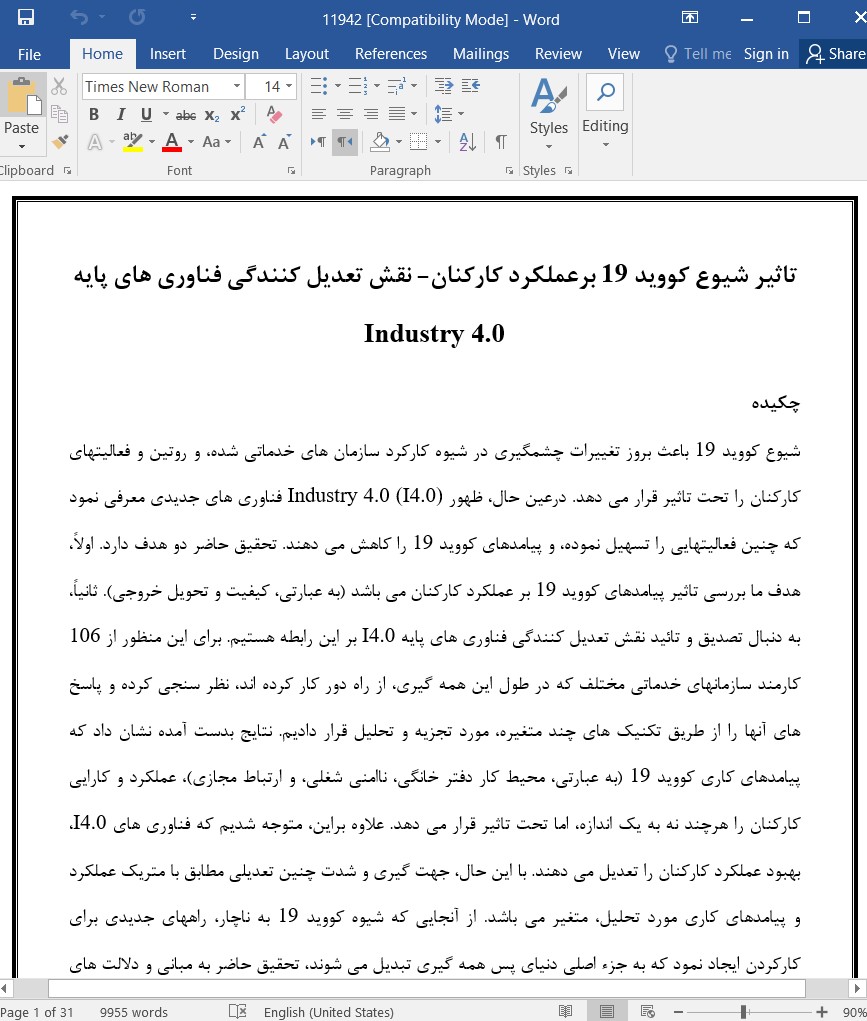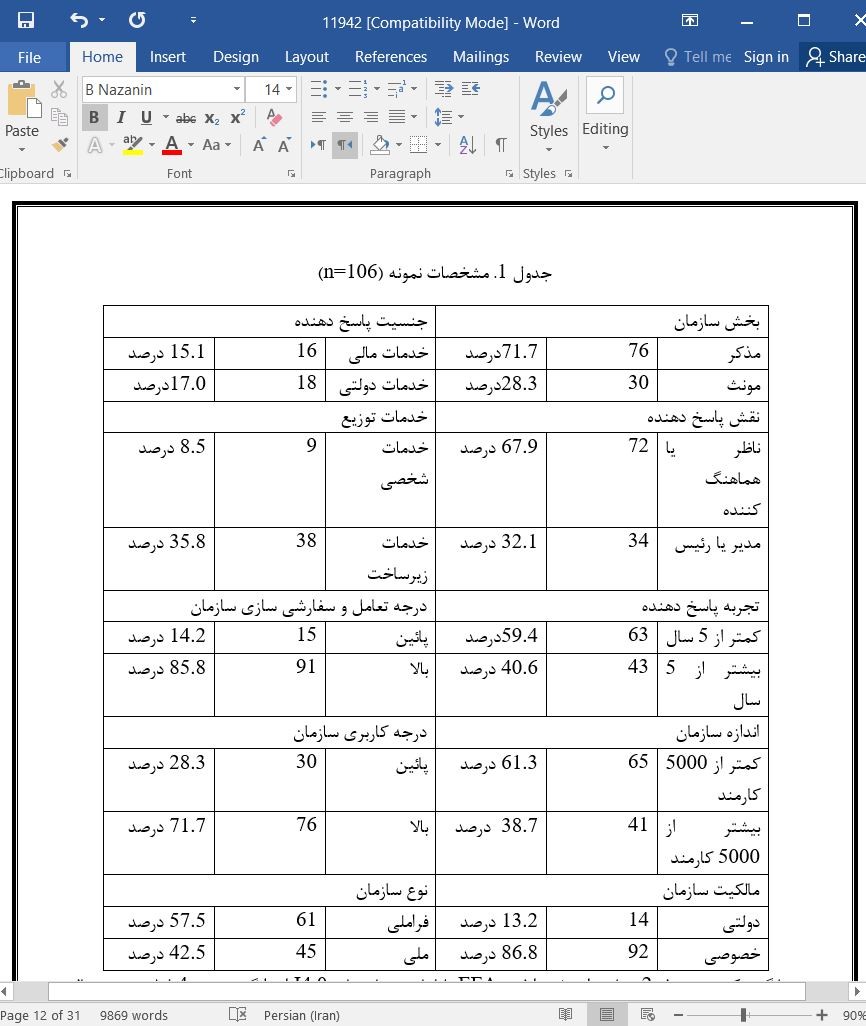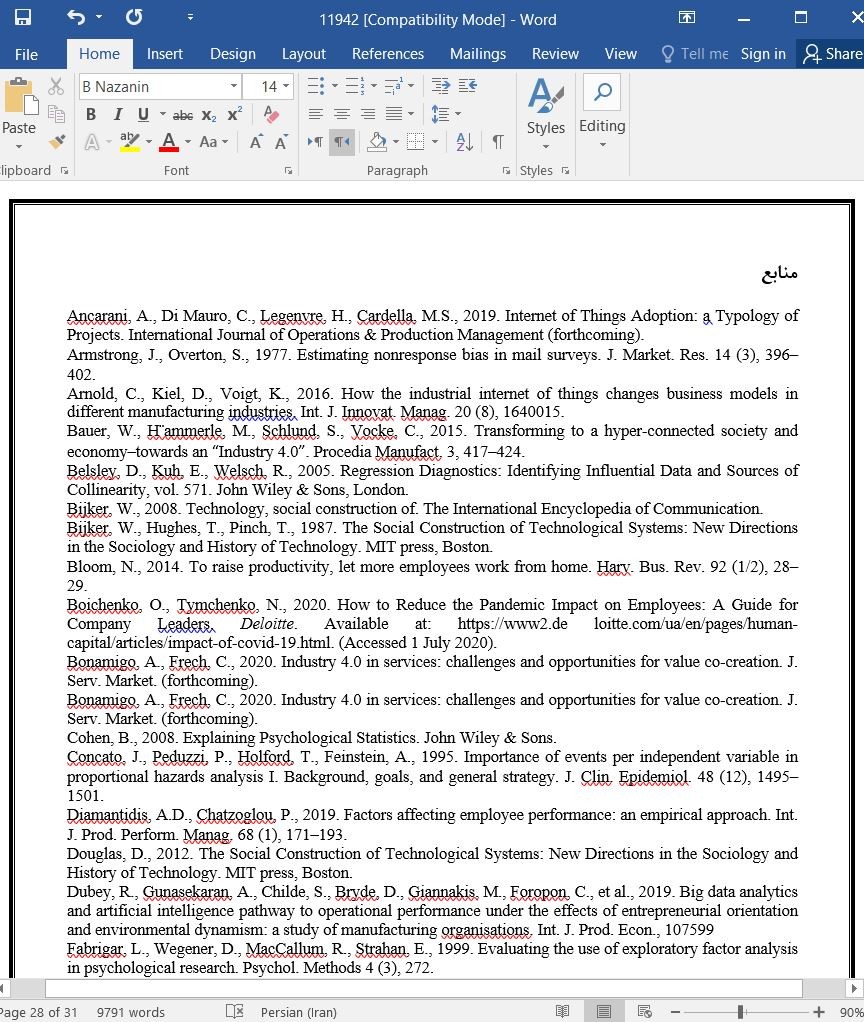
تاثیر شیوع کووید 19 بر عملکرد کارکنان- نقش تعدیل کنندگی فناوری های پایه Industry 4.0
چکیده
شیوع کووید 19 باعث بروز تغییرات چشمگیری در شیوه کارکرد سازمان های خدماتی شده، و روتین و فعالیتهای کارکنان را تحت تاثیر قرار می دهد. درعین حال، ظهور Industry 4.0 (I4.0) فناوری های جدیدی معرفی نمود که چنین فعالیتهایی را تسهیل نموده، و پیامدهای کووید 19 را کاهش می دهند. تحقیق حاضر دو هدف دارد. اولاً، هدف ما بررسی تاثیر پیامدهای کووید 19 بر عملکرد کارکنان می باشد (به عبارتی، کیفیت و تحویل خروجی). ثانیاً، به دنبال تصدیق و تائید نقش تعدیل کنندگی فناوری های پایه I4.0 بر این رابطه هستیم. برای این منظور از 106 کارمند سازمانهای خدماتی مختلف که در طول این همه گیری، از راه دور کار کرده اند، نظر سنجی کرده و پاسخ های آنها را از طریق تکنیک های چند متغیره، مورد تجزیه و تحلیل قرار دادیم. نتایج بدست آمده نشان داد که پیامدهای کاری کووید 19 (به عبارتی، محیط کار دفتر خانگی، ناامنی شغلی، و ارتباط مجازی)، عملکرد و کارایی کارکنان را هرچند نه به یک اندازه، اما تحت تاثیر قرار می دهد. علاوه براین، متوجه شدیم که فناوری های I4.0، بهبود عملکرد کارکنان را تعدیل می دهند. با این حال، جهت گیری و شدت چنین تعدیلی مطابق با متریک عملکرد و پیامدهای کاری مورد تحلیل، متغیر می باشد. از آنجایی که شیوه کووید 19 به ناچار، راههای جدیدی برای کارکردن ایجاد نمود که به جزء اصلی دنیای پس همه گیری تبدیل می شوند، تحقیق حاضر به مبانی و دلالت های نظری و عملی مهمی برای بهبود عملکرد کارکنان از طریق دیجیتال سازی سازمان های خدماتی اشاره می کند.
1. مقدمه
شیوع کووید 19 باعث شده تا تقریباً همه کارکنان گرداگرد جهان، در محیطی کاملاً متفاوت با قبل کار کنند. مداخلات ناشی از کووید 19 نظیر فاصله اجتماعی، محدودیت های سفر، کار مجازی یا از راه دور، و حداقل تعداد کارکنان، تداوم فرایندهای پیشین را محدود نموده و به این طریق شیوه کارکرد کارکنان را تغییر می دهد (Gallup، 2020؛ Tortorella و همکاران، 2020a). چنین مداخلات ناشی از شیوع کووید 19، باعث بروز تغییرات رفتاری کارکنان گردید، که با قرنطینه های متعدد از موقتی به طولانی مدت تغییر می کند. مدیران خط، رهبران تیم و متخصصین منابع انسانی در مورد چنین تغییرات رفتاری بسیار نگران بوده اند، چرا که بر رفاه و بهزیستی عاطفی، شناختی و فیزیکی کارکنان و در نهایت بر خدمات قابل تحویل و عملکردآنها تاثیر می گذارند (Graves و Karabayeva، 2020 ).
5.2. مبانی عملی
در مورد مشارکت های عملی، تحقیق انجام شده برای مدیران سازمانهای خدماتی که در طول شیوع کووید 19 مشغول پیاده سازی فناوری های I4.0 و دورکاری هستند، استدلالاتی مطرح نمود. یافته های بدست آمده نشان می دهد که سازمانهای خدماتی باید براساس دروس آموخته شده از تاثیرات کاری کووید 19، در مورد فرایندها و روتین هایشان برای دوره پس از همه گیری مجدداً فکر کنند. بطور مثال، تقویت محیط دفتر خانگی جایگزینی جالب توجه برای بهبود عملکرد کارمندان این سازمان ها به حساب می آید. بعلاوه، نتایج بدست آمده نشان می دهد سازمانهایی که فناوری های پایه I4.0 و شیوه های ارتباط مجازی را می پذیرند، عملکرد کارمندان را به ویژه از نظر خروجی کیفیت، بهبود می بخشند. انتظار می رود این بینش برای رهبران تیم و مدیران خطی که در بازداری از تاثیر منفی همه گیری کووید 19 بر عملکرد کارمندان با مشکل مواجه می شوند، ارزش افزوده خلق نماید. چنین نشانه هایی نه فقط در طول شیوع همه گیری ارزشمند واقع می شوند، بلکه همچنین، میراثی در خصوص زمینه صنعت خدمات برای جهان پس از همه گیری محسوب می شوند.
Abstract
COVID-19 outbreak has implied significant changes in the way service organizations work, affecting employees' routine and activities. At the same time, the advent of Industry 4.0 (I4.0) introduced new technologies that might facilitate such activities, mitigating the COVID-19's implications. The objective of this research is two-fold. First, we aim at examining the impact of COVID-19's work implications on employees' performance (i.e. output quality and delivery). Second, we seek to verify the moderating role of I4.0 base technologies on this relationship. We surveyed 106 employees of different service organizations who have been working remotely during the pandemic and analyzed their responses through multivariate techniques. Results revealed that COVID-19's work implications (i.e. home office work environment, job insecurity and virtual connection) do impact employee's performance, although not at the same extent. Further, we found that I4.0 technologies moderate the enhancement of employee's performance. However, the orientation and intensity of such moderation may vary according to the performance metric and work implication under analysis. As COVID-19 outbreak inevitably pushed new ways of working that can become an integral part of the post-pandemic world, our research provides important theoretical and practical implications for improving employee's performance through the digitalization of service organizations.
1. Introduction
COVID-19 outbreak has pushed almost all the employees around the world to work in a completely different setting in comparison to what it used to be before. COVID-19 triggered interventions such as social distancing, travel restrictions, virtual or remote work, and skeleton crews have constrained the continuance of earlier processes, thereby changing the way employees work (Gallup, 2020; Tortorella et al., 2020a). Such interventions triggered by COVID-19 outbreak introduced employee behavioral changes, which can transition with multiple lockdowns from temporary to long-lasting. Line managers, team leaders and human resources professionals are very concerned about such behavioral changes as they can influence employees’ emotional, cognitive, and physical wellbeing, which can ultimately impact their deliverables and performance (Graves and Karabayeva, 2020).
5.2. Practice implications
Regarding practical contributions, our research raised arguments to managers of service organizations that are implementing I4.0 technologies and working remotely during the COVID-19 outbreak. Our findings indicate that service organizations might need to rethink their processes and routines for the post-pandemic period based on the lessons learned from the COVID-19’s work implications. For instance, the reinforcement of home office environment appears to be an interesting alternative to enhance performance of the employees of these organizations. Furthermore, our results indicate that organizations concurrently adopting I4.0 base technologies and virtual connection practices might improve employees’ performance, especially in terms of quality output. This insight is expected to add value to team leaders and line managers who face difficulty in containing the negative impact of COVID-19 pandemic on employee’s performance. Such indications might be valuable not only during the pandemic outbreak, but also be a legacy to the service industry context for the post-pandemic world.
چکیده
1. مقدمه
2. پیشینه نظری و توسعه فرضیات
3. روش
3.1. توسعه ابزار
3.2. انتخاب نمونه و جمع آوری داده ها
3.3. روایی و پایایی ساختارها
3.4. تحلیل داده ها
4. نتایج و بحث
5. نتیجه گیری
5.1. مبانی نظری
5.2. مبانی عملی
5.3. محدودیت هاو تحقیق آتی
ضمیمه A. داده های تکمیلی
منابع
Abstract
1. Introduction
2. Theoretical background and hypotheses development
3. Method
3.1. Instrument development
3.2. Sample selection and data collection
3.3. Validity and reliability of constructs
3.4. Data analysis
4. Results and discussion
5. Conclusion
5.1. Theoretical implications
5.2. Practice implications
5.3. Limitations and future research
Appendix A. Supplementary data
References
- اصل مقاله انگلیسی با فرمت ورد (word) با قابلیت ویرایش
- ترجمه فارسی مقاله با فرمت ورد (word) با قابلیت ویرایش، بدون آرم سایت ای ترجمه
- ترجمه فارسی مقاله با فرمت pdf، بدون آرم سایت ای ترجمه



